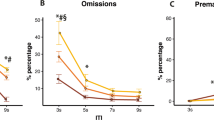Abstract
Rationale: Impulsivity is associated with increased risk for alcoholism. Alcohol also may increase impulsive behavior, although little is known about the processes underlying this effect. Objectives: This study tested a model proposing that the executive processes of working memory (WM) and conditional associative learning (CAL) modulate behavioral inhibition. Subjects had either a positive (FHP) or a negative (FHN) family history of alcoholism. Hypotheses were that alcohol would increase Go/No-Go impulsive responding but only in subjects with low working memory capacity (low-WM), low-CAL ability, or FHP for alcoholism. The model also predicted that WM and CAL modulate inhibitory responses to contingency reversal on a Go/No-Go task. Methods: A Go/No-Go learning task with a midway contingency reversal was administered to 71 FHP and 78 FHN subjects when sober and after drinking one of two moderate doses of alcohol. WM (digits backward) and CAL (conditional spatial association task) were also assessed when sober. Results: Alcohol resulted in more false alarms but only in low-WM subjects. Both WM and CAL modulated learning to inhibit behavior after contingency reversal, suggesting separate modulation mechanisms for WM and CAL. Subjects with low- capacity WM and subjects with low-capacity CAL ability had more difficulty learning response inhibition after contingency reversal. FHPs and FHNs did not differ in their response to alcohol. Conclusions: The results support our model of the modulatory role of WM and CAL in the ongoing regulation of behavioral inhibitory systems. The results also suggest that individuals with low capacity WM are more susceptible to alcohol’s effect of increasing impulsive behavior, suggesting that alcohol reduces the capacity of working memory to modulate response inhibition.
Similar content being viewed by others
Author information
Authors and Affiliations
Additional information
Received: 3 March 1999 / Final version: 28 May 1999
Rights and permissions
About this article
Cite this article
Finn, P., Justus, A., Mazas, C. et al. Working memory, executive processes and the effects of alcohol on Go/No-Go learning: testing a model of behavioral regulation and impulsivity. Psychopharmacology 146, 465–472 (1999). https://doi.org/10.1007/PL00005492
Issue Date:
DOI: https://doi.org/10.1007/PL00005492




